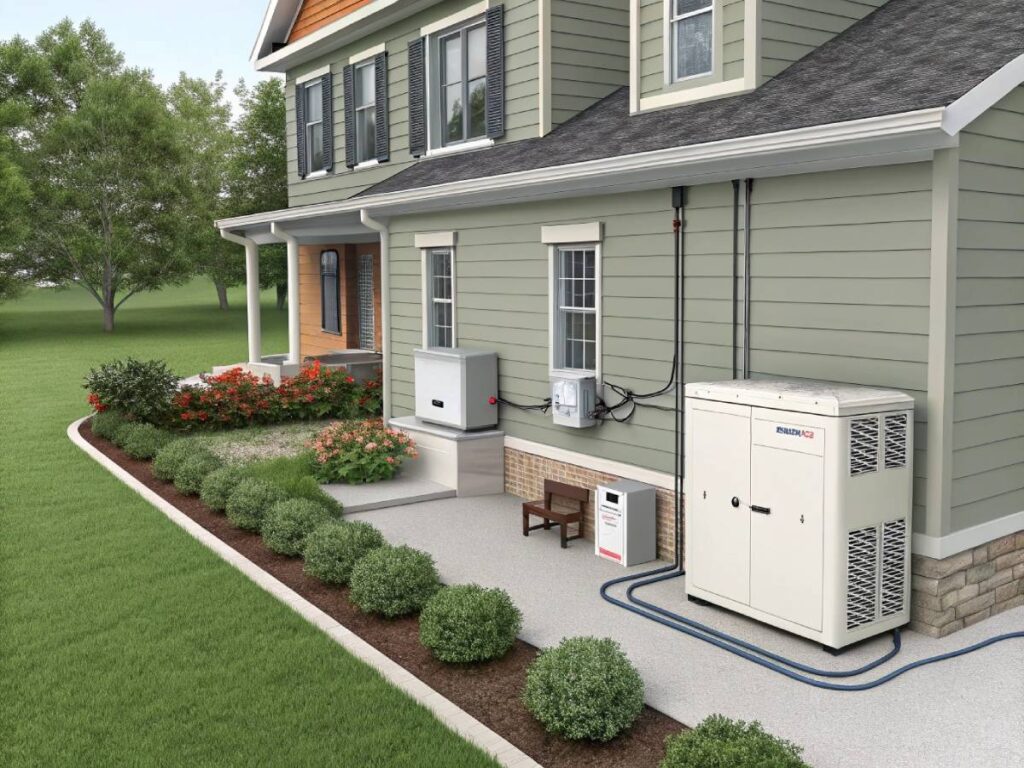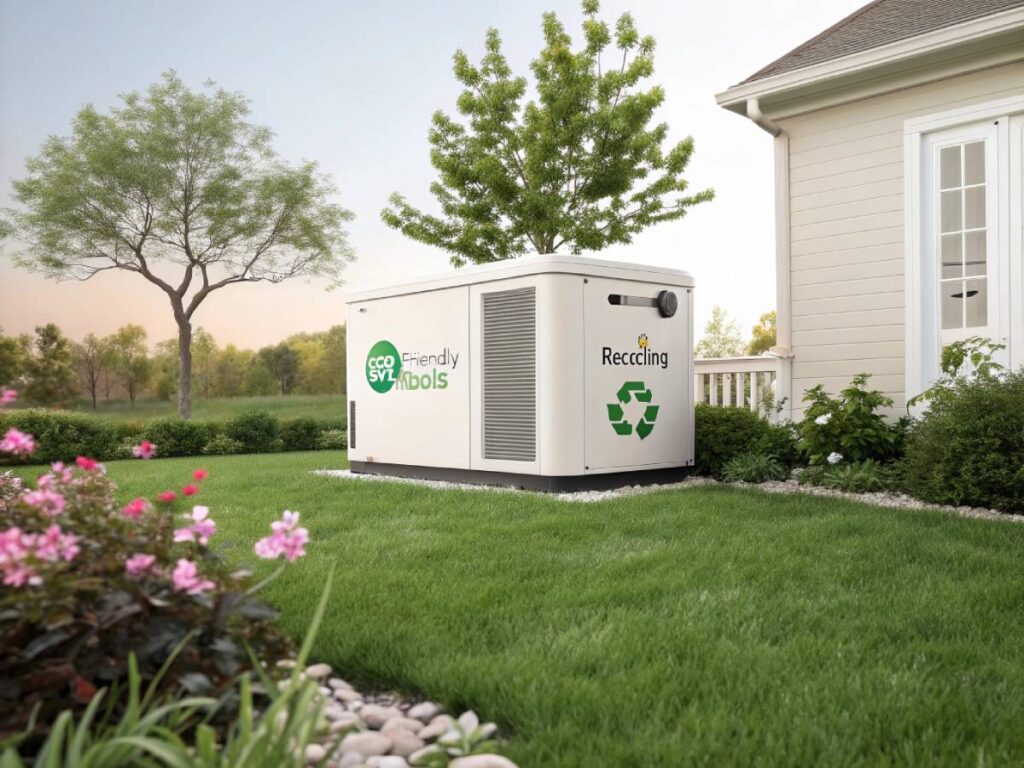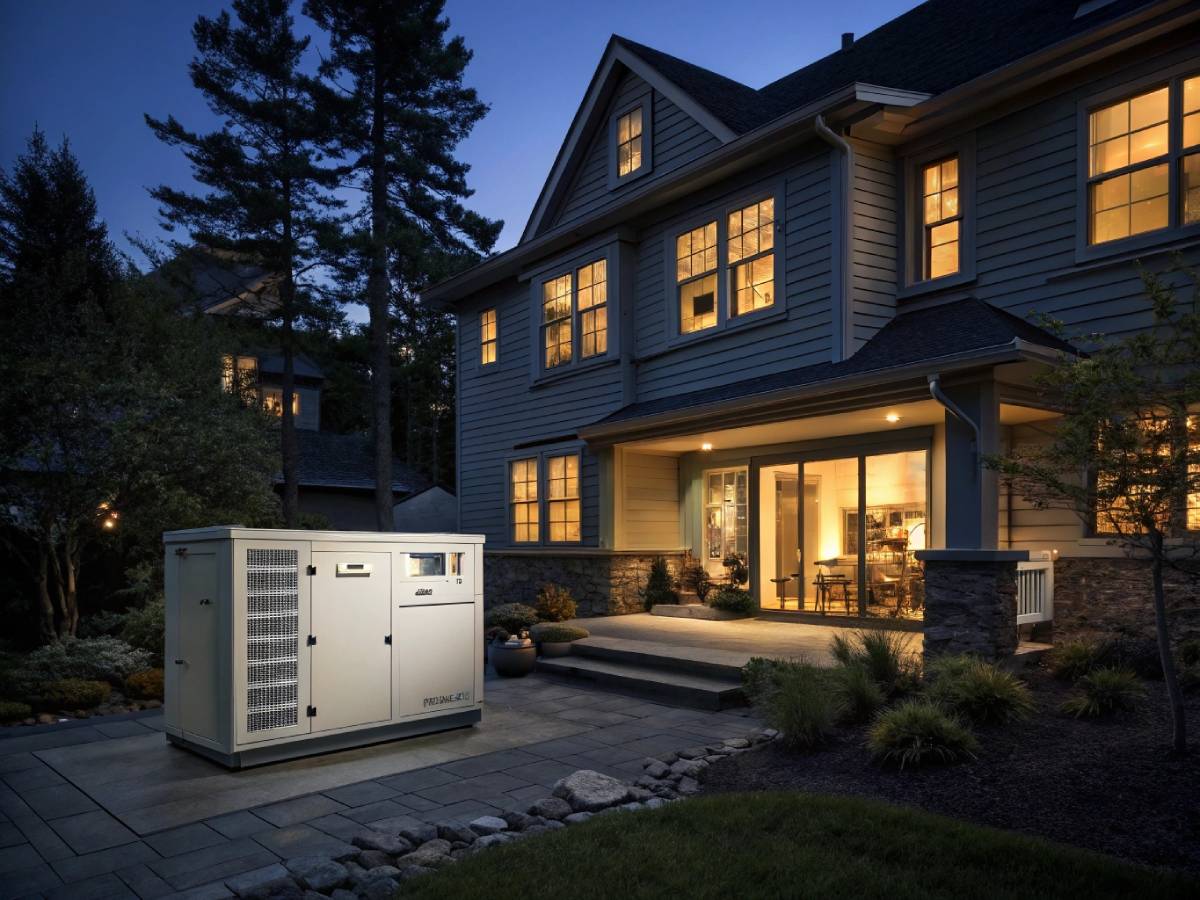Imagine a power outage striking in the middle of a chilly winter night. While others scramble in the dark, your home remains a haven of warmth and light.
Standby generators are the unsung heroes ensuring your life doesn’t skip a beat during unexpected blackouts.
Whether it’s keeping essential appliances running or safeguarding vital medical equipment, choosing the right generator brand is crucial.
Dive into our comprehensive comparison to discover the perfect power partner that aligns with your lifestyle and ensures peace of mind, no matter what Mother Nature throws your way.
Standby Generators Explained

The Importance of Standby Generators
Standby generators are like trusty sidekicks for your home, ready to spring into action when the lights go out. Perfect for folks living where power cuts are common, these lifesavers keep your heating, cooling, and all those must-have gadgets ticking along without missing a beat. If your life depends on keeping the juice flowing—whether you rely on medical gizmos or work from your den—a standby generator lets you sleep easy, knowing you’re covered.
Perks of owning one of these bad boys include:
- Automatic start-up when the power goes haywire
- Steady power flow for your life’s essentials
- Keeping medical gear safe and sound
- Boosting your home’s value with added reliability
Want to dig deeper into why a standby generator is your home’s best friend? Check out our piece on why standby home generators rock.
Factors to Consider When Choosing a Standby Generator Brand
Picking the right standby generator is like choosing a reliable partner—it takes some thought to make sure it’ll stick around through thick and thin. Here’s what to ponder:
- Toughness and Trust Factor
- Investigate the brand’s reputation and how well their machines stand the test of time.
- Check out what folks are saying online for a peek into their real-life experiences.
- Juice Specs
- Get a handle on the generator’s power (in kW) to be sure it matches what your home needs.
- Check for features like automatic switch-over and load management to keep things running smoothly.
- Fuel Choices
- They don’t all sip the same stuff—some use natural gas, propane, or diesel. Each has its quirks. Discover more in our breakdown of natural gas vs propane standby generators.
- Smart Tech Goodies
- Into smart home gear? Look for models that sync up with your devices for remote check-ins and control.
- Sound Levels
- Some make more noise than others. If you’re worried about waking the neighbors, find a quieter model.
- Green Footprint
- Think about Mother Earth too. Some brands have models aimed at being kinder to the environment. Curious? Read about eco-friendly standby generators.
Take a quick glance at the key points:
| Factor | What to Look Out For |
|---|---|
| Toughness and Trust Factor | Reputation, user reviews |
| Juice Specs | Power output, automatic switch features |
| Fuel Choices | Gas, propane, diesel |
| Smart Tech Goodies | Smart home compatibility, remote access |
| Sound Levels | Noise ratings, quieter options |
| Green Footprint | Eco-friendly touches, low emissions |
Need more help choosing the perfect standby generator brand? Head over to our guide on top standby generators for your pad.
Picking a standby generator’s no small feat, but hashing out these details ensures you find the perfect match that keeps your home humming, rain or shine. If you’re new to the scene, our guide to standby home generators for rookies lays it all out in easy-to-eat nuggets.
Reliability and Performance
When choosing a standby generator for your home, you’re not just picking a machine—you’re picking peace of mind. Here’s what to keep in mind to ensure yours turns on when you really need it.
Key Considerations for Generator Reliability
Let’s break down what makes a generator reliable:
- Durability: Your generator should be built tough, like your favorite pair of boots—able to handle any weather while being handy for years.
- Engine Quality: A strong engine keeps the generator humming smoothly for a long time—kind of like your grandma’s old car that’s still going strong.
- Maintenance Requirements: Everyone loves low upkeep. Opt for a generator that won’t ask for constant attention, yet delivers top-notch service.
- Warranty and Support: A solid warranty and helpful customer service say a lot about the maker’s trust in their generator’s dependability.
| Key Reliability Factor | Description |
|---|---|
| Durability | Stands up to tough conditions |
| Engine Quality | Keeps running smoothly for longer |
| Maintenance Requirements | Needs less frequent parenting |
| Warranty and Support | Solid warranty terms and friendly support |
Need tips on keeping your generator in shape? Check out generator maintenance tips.
Performance Features to Look Out For
Performance is where a generator earns its keep. Here are the essentials:
- Power Output: Know your demand—generators get rated in kilowatts (kW). A surprising wattage might catch you off guard, so get the right fit. We’ve got the guide right here – sizing standby generator for home.
- Fuel Efficiency: Good fuel efficiency is your wallet’s best friend, helping those dollars stretch. Check out options – natural gas vs propane generators.
- Startup Time: When the lights go out, time’s of the essence. A quick starter keeps critical things ticking without a hitch.
- Load Management: This nifty feature juggles the power load like a pro, ensuring your toaster and TV can coexist peacefully.
- Noise Levels: You don’t want a ruckus in the background while you’re reading this. Silence that roar with a quieter model – generators for chilly places.
| Performance Feature | Description |
|---|---|
| Power Output | Kilowatts (kW) tell you its capability |
| Fuel Efficiency | Gets the most out of each drop of fuel |
| Startup Time | Quick to kick in after power loss |
| Load Management | Shares the juice smartly across gadgets |
| Noise Levels | Measures how loud it gets when running (dB) |
Wondering what’s the damage to the wallet? This cost analysis lays it all out.
By zoning in on these reliability and performance points, you’ll be set to find a standby generator that fits your life perfectly. For that all-encompassing guide, we’ve got you covered right over here – home generators guide.
Fuel Options
Choosing the right standby generator is all about picking the best fuel for your needs. Each option brings its own set of perks and pitfalls, so it’s key to weigh the choices based on what really matters for you.
Understanding Different Fuel Options for Standby Generators
Most standby generators run on one of these three power options: natural gas, propane (LPG), or diesel. Each of these fuels has its own quirks that can affect how well your generator runs, how much it costs you, and its impact on the planet.
Pros and Cons of Various Fuel Types
Let’s break down the good and the bad for each fuel type when it comes to standby generators:
Natural Gas
Pros:
- Always there thanks to existing gas lines
- Usually cheaper to run than propane and diesel
- Burns cleaner, so better for Mother Earth
Cons:
- Need a gas pipeline hookup
- Could face supply hiccups during big storms
- Might need some complicated setup work
Propane (LPG)
Pros:
- Store it right at home in big tanks
- Stays good longer than diesel
- Cleaner burn than diesel
Cons:
- Spendy compared to natural gas
- You’ll need frequent top-ups and to keep an eye on levels
- Those storage tanks can chow down on space
Diesel
Pros:
- Packs a punch with loads of power per drop
- Can find everywhere and anywhere
- Does great in the cold
Cons:
- Not so eco-friendly with its more gassy outputs
- Needs love and care to keep it pure and unpolluted
- Doesn’t last as long as propane
| Fuel Type | Supply | Cost | Environmental Impact | Maintenance |
|---|---|---|---|---|
| Natural Gas | Constant | Cheaper | Low | Needs pro setup |
| Propane (LPG) | Stashed Onsite | Pricier | Medium | Regular tank fill-ups and checks |
| Diesel | On-site | Average | High | Needs routine up-keep and fuel care |
For folks whose electricity needs are a top priority, picking the right fuel can really impact how smoothly and reliably your generator hums along. Want more insight about natural gas vs propane standby generators? Dive into our detailed standby home generators guide for more.
When plotting out your generator setup, think about stuff like fuel efficiency, what the whole deal will cost, and the eco-factor. Need more tips on getting your generator installation just right? Check out preparing for standby generator installation and standby generator installation. Plus, keep yourself savvy about standby generator cost analysis to juggle upfront costs with long-haul value like a pro.
Maintenance and Service
Your trusty standby generator’s got your back in the power department, but it’s not a “set it and forget it” kind of deal. Keeping up with its regular upkeep is like feeding and grooming a loyal pet—necessary for keeping it in tip-top shape. Here’s the lowdown on giving your generator the TLC it deserves.
Importance of Regular Maintenance
Nobody wants to be in the dark, especially when you’ve got important gadgets like medical devices or your work-from-home setup depending on a reliable power source. Regular check-ups ensure your generator doesn’t poop out on you at the worst possible moment.
Why you’re gonna love a well-maintained generator:
- Better Performance: Just like how a car purrs after an oil change, a generator purrs when kept in line.
- Longer Life: Maintenance avoids those stress lines that can end a generator’s career prematurely.
- No Last-Minute Surprises: Stay ready for any lights-out action with a well-cared-for unit.
- Fewer Bills: Fixing little hiccups before they grow into big headaches saves you some bucks.
Here’s the nuts and bolts of what to do:
| Maintenance Task | How Often? |
|---|---|
| Oil changes | Every 100-150 hours—like clockwork |
| Air filter swap | Once a year or when it looks sad |
| Battery checks | Each month |
| Top up coolant | Monthly |
| Run a full check | Every 6 months |
For those who want the full breakdown, check out our generator maintenance tips.
Service and Support Available for Standby Generators
Your generator’s favorite tunes are TLC and support. Get cozy with the service options different brands push your way. It’s not just a purchase; consider it an investment in peace of mind.
What to look for:
- Warranty Know-How: Different strokes for different folks—read the small print.
- Service Squad: Where are the nearest qualified hands to get you out of a jam?
- Customer Service Story: Is their helpline a blessing or a busy signal?
- Easy Life Plans: Some brands offer scheduled TLC that keeps things simple.
- Parts Depot: Quick access means you’re not leftovers in the dark.
Playing ‘which brand is better?’ Bingo involves seeing how they handle your maintenance woes. It could mean the world between an ‘oops’ moment and smooth sailing.
Also, don’t skip out on how others feel about it. Dive into customer feedback with our piece on reading reviews right—a wise shopper’s secret weapon.
By keeping your generator’s maintenance regular and knowing who’s got your back in the support department, you stay golden when the lights fizzle. For more juicy details, explore our comprehensive standby home generators guide. Also, take a gander at fixing generator troubles and keeping it safe to keep things rolling smoothly.
Smart Home Integration
Mixing Smart Gizmos with Standby Generators
Hooking up smart gadgets with your standby generator is like sharing a brain with your house. This kind of setup lets homeowners track, tweak, and manage their generators right from their smartphones or similar devices. Imagine getting an alert when something’s wonky, running checks without leaving the couch, or having your generator flip on automatically when the lights go out.
Here’s how it usually works:
- Smartphone Apps: These apps are your magic wand for generator control and status checks. Handy alerts can tell you when it’s time for a tune-up or when that fuel is getting low.
- Home Automation Systems: No need to lift a finger—link your generator with your other smart home whatchamacallits. So, when the power’s out, it kicks in seamlessly.
- Voice Assistants: Got Alexa or Google Home? Just tell them what you need—checking the generator’s humming status or giving it a nudge is as easy as shouting across the room.
Why Bother With Smart Home Integration?
Fusing smart tech with a standby generator ain’t just for show. There’s a boatload of perks that make it a smart move for safety, ease, and even saving a buck or two.
Real-Time Monitoring: Keeping tabs on your generator as things happen means you’re ready to fix issues ASAP. Little alerts pop up when TLC is needed, or something seems off.
| Smart Feature | Benefit |
|---|---|
| Real-Time Monitoring | Spot issues early |
Remote Control: Imagine the freedom of managing your generator from miles away. Perfect for folks who aren’t hangin’ around home base when the power makes a mad dash.
| Smart Feature | Benefit |
|---|---|
| Remote Control | Control on the go |
Automated Operations: Automatic power juggling ensures smooth sailing during outages, keeping your blood pressure down. It’s golden for peeps with medical needs or home offices.
| Smart Feature | Benefit |
|---|---|
| Automated Operations | Bye-bye power cuts |
Enhanced Safety: Smart hookups can mean your generator calls it quits in dodgy situations, stopping bad things from happening.
| Smart Feature | Benefit |
|---|---|
| Enhanced Safety | More peace of mind |
Energy Efficiency: These smart cookies help your generator sip fuel daintily, which is good for the wallet and Mother Earth.
| Smart Feature | Benefit |
|---|---|
| Energy Efficiency | Save money, save the planet |
These smart perks make the whole setup appeal to just about any homeowner. Wanna know more about how to get your smart home generator groove on? Check out our smart home standby generators page. For the whole scoop on generators, jump to our standby home generators guide.
Curious about what it’ll set you back and what it adds up to over time? Dive into our standby generator cost analysis for the nitty-gritty.
Noise Levels and Environmental Impact

When thinking about standby generators, two main things pop up: noise and the environment. These aren’t just side notes – they can make or break your decision and your satisfaction over time.
Noise Considerations for Standby Generators
Generators aren’t all the same, especially when it comes to how loud they are. Here’s the scoop: you want to check out the decibel (dB) rating. That’s the magic number telling you how loud a generator will be. Generators with a smaller dB number are the quietest. If you fancy a relaxingly quiet home, keep your eyes peeled for these softer-speaking machines.
| Generator Type | Average Noise Level (dB) |
|---|---|
| Small Portable | 60 – 70 |
| Standby Home Generator | 65 – 75 |
| Industrial Generator | 75 – 90 |
For those who hate getting drowned in noise, aim for generators at the quieter end of the chart. It’s also smart to search for special features like soundproof boxes or goodies that dampen those nasty vibrations.
Environmental Impact of Standby Generators
Now, let’s dive into what these beasties mean for Mother Earth. Different types of fuel and tech can mess things up in different ways. Here are the major things to chew over:
- Fuel Efficiency: The less fuel you burn, the fewer nasty fumes you puff into the sky. Generators that sip rather than gulp can help you keep your carbon footprint neat and tidy.
- Emission Levels: These bad boys can churn out stuff like carbon monoxide (CO) and nitrogen oxides (NOx). Generators that play nice with stricter emission rules will leave the air a little less messy. Curious about how natural gas and propane measure up? Dive into our deep dive on fuel types.
- Noise Pollution: Noise isn’t just a personal thing – it affects your neighbors and community too. Quieter generators keep everyone happier.
- Eco-Friendly Features: Some of today’s smart generators come with earth-friendly tech that gives the planet a break. Think high-tech fuel injectors, catalytic converters, or engines designed to keep emissions low. Looking for a deeper understanding? Peek at our piece on eco-friendly generators.
By keeping noise and environmental effects in mind, you’re setting yourself up to choose a generator that fits just right in your world without messing it up. Curious about more tips and tricks? Check out our complete guide to standby generators.
Cost Analysis
Peeking into the wallet for standby generators? It’s all about weighing the initial cost against long-term perks. And let’s not forget the wild cards that can sway the end price—things like fuel options, installation quirks, and maintenance.
Initial Investment vs. Long-Term Value
When it comes to standby generators, prices can be all over the map depending on size, bells and whistles, and brand. Knowing how to juggle the upfront cost and the long haul benefits is vital for keeping the lights on and keeping your pockets happy.
| Cost Element | Initial Investment | Long-Term Value |
|---|---|---|
| Generator Unit | $2,500 – $15,000 | Keep power running smoothly |
| Installation | $3,000 – $6,500 | Bump in home value, insurance bonuses |
| Maintenance | $200 – $600/year | Steady power output, longer shelf life |
| Fuel Costs | All over the place | Changes with fuel choice (peek at natural gas vs propane standby generators) |
Going for a primo standby generator can pay off big time. Not only does it keep you juiced up during blackouts, it might even pump up your property’s worth and shave off some insurance costs. Plus, a routine touch-up keeps your generator humming for years.
For a deep dive on what you’re really putting your money into, check out our standby generator cost analysis.
Factors Influencing the Cost of Standby Generators
A sprinkle of things can shake up how much a standby generator might set you back:
- Size and Capacity: Full-house powers versus just the essentials make a big dent in your budget. Want to size it right? Pop over to sizing standby generator for home.
- Fuel Type: Whether it’s natural gas, propane, or diesel, your fuel choice hits both the wallet upfront and while running. For the full scoop, see natural gas vs propane standby generators.
- Installation: How tricky things go depends on your setup and local labor prices. Getting your place set up for the install can tweak these numbers—get the details in preparing for standby generator installation.
- Maintenance Requirements: Regular TLC stretches your investment further. The cost here might swing with the brand and model. Dig into our standby generator maintenance tips.
- Smart Features: Generators with gadgets like smart home tie-ins or nifty monitoring features might cost more but offer some cool conveniences. For the lowdown, check our piece on smart home standby generators.
Being clued in on these factors helps folks pick wisely when investing in a standby generator. For more nuggets of knowledge and tips, visit our standby home generators guide.
Customer Reviews and Reputation
Choosing the right standby generator brand is like picking a reliable friend to keep the lights on. The buzz around town, from those who’ve been there and done that, can really help cut through the noise. Genuine reviews give you the lowdown on how these lifelines hold up when the lights go out.
Importance of Customer Reviews
Customer reviews spill the beans on generators’ real-world creds. They offer unfiltered tales about whether a machine’s a hero or a headache. These accounts ensure you’re not walking in blind but strolling through learned experiences.
Why bother with customer reviews? Check it:
- Real-world tales: Folks recount how the generator stood against actual power cuts.
- Ruggedness and reliability: Look out for stories of breakdowns or durability hiccups.
- Ease of use: Setup and operation facts that’ll save you time—or headaches.
- Customer support story: Good or bad experiences with service, parts, and support.
For generator newbies, our standby home generators guide breaks down the review game, so you know what really matters.
Evaluating the Reputation of Standby Generator Brands
Sizing up the reputation of generator brands is a two-parter: listen to the users and tap into expert minds. Here’s what to weigh when checking out a brand’s street cred:
| Criteria | What’s Checkin’ |
|---|---|
| Customer Happiness | Balance between smiles (positive) and frowns (negative) in reviews. |
| Trusty Performance | How dependably they fire up during outages with no fuss. |
| Support After Sale | How helpful the support squad is once you snag their product. |
| Warranty and Promises | What’s covered and for how long—they’ve got your back, or do they? |
| Brand History | The years they’ve been in the biz, hinting at trustworthiness. |
| Expert Opinions | Views from the tech wizards and gear gurus. |
If you’re into the snazziest in tech, peek at smart home standby generators for insights into brands that are all about new-age smarts and seamless connection.
When sifting through reviews and brand choices, hitting up pieces like standby generator troubleshooting helps uncover common hiccups and fixes. Plus, a look-see at best standby generators for home can round out your insight, pointing to solid choices for peace of mind.
Conclusion
Selecting the right standby generator brand is more than just a purchase—it’s an investment in your home’s resilience and your family’s comfort. By evaluating factors like power output, fuel efficiency, and smart home integration, you ensure that your generator not only meets your immediate needs but also adapts to future technological advancements.
Reliability and performance are paramount, as a dependable generator safeguards against unexpected outages, maintaining essential services without fail. Additionally, considering the environmental impact and noise levels ensures that your choice aligns with both your lifestyle and ecological values.
Regular maintenance and robust customer support further enhance the longevity and efficiency of your generator, providing peace of mind.
Ultimately, customer reviews and brand reputation offer invaluable insights, helping you make an informed decision that balances cost with quality. Embrace the power of preparedness by choosing a standby generator that seamlessly integrates into your home, offering uninterrupted comfort and security year-round.
Final Thoughts
Investing in a standby generator is a proactive step towards ensuring your home remains a sanctuary, regardless of external power disruptions.
By thoroughly comparing brands and understanding the intricate details of each option, you empower yourself to make a choice that not only meets your immediate needs but also adapts to future advancements and changing circumstances. Remember, the right generator offers more than just backup power—it provides security, convenience, and peace of mind.
As you navigate through the myriad of options, prioritize reliability, efficiency, and smart integration to fully harness the benefits of modern standby generators. Embrace the assurance that comes with being prepared, and let your generator be the silent guardian that keeps your home running smoothly, no matter what challenges arise.
Main Tips
- Assess Your Power Needs: List essential appliances and calculate total wattage to choose the right generator size.
- Consider Fuel Availability: Select a fuel type that is readily available and suits your usage patterns.
- Prioritize Reliability: Opt for brands with strong reputations and positive customer reviews.
- Integrate Smart Features: Enhance control and monitoring through smart home compatibility.
- Regular Maintenance: Schedule routine check-ups to ensure optimal performance and longevity.
- Evaluate Noise Levels: Choose quieter models to maintain a peaceful home environment.
- Balance Cost and Quality: Weigh initial investment against long-term benefits and savings.
- Check Warranty and Support: Ensure comprehensive coverage and accessible customer service.
FAQs
What is a standby generator and how does it work?
A standby generator automatically powers your home during outages by switching on when it detects a loss of electricity, ensuring continuous operation of essential appliances and systems.
How do I determine the right size generator for my home?
Assess your power needs by listing essential appliances and their wattage, then choose a generator that can handle the total load with some extra capacity for future needs.
What are the main fuel options for standby generators?
Standby generators typically use natural gas, propane, or diesel, each with its own advantages and considerations regarding cost, availability, and environmental impact.
How often should I maintain my standby generator?
Regular maintenance is crucial; generally, it should be serviced at least twice a year, with more frequent checks during heavy usage periods to ensure optimal performance.
Can standby generators be integrated with smart home systems?
Yes, many modern standby generators offer smart integration features, allowing you to monitor and control them remotely via smartphone apps and home automation systems.
Recommended Products and Accessories
- Generac Guardian Series: Renowned for reliability and smart home integration.
- Kohler 20RESCL-200SELS: High-performance generator with eco-friendly features.
- Cummins Quiet Connect Series: Known for low noise levels and durability.
- Champion Power Equipment 12kW Standby Generator: Offers excellent fuel efficiency and automatic transfer switch.
- Generac Mobile Link: Smart monitoring system compatible with various Generac generators.
- APC Home UPS: Essential backup power accessory for sensitive electronics.
- Fuel Storage Tanks: Compatible with propane and natural gas generators for efficient fuel management.
- Generator Maintenance Kits: Comprehensive kits including oil, filters, and other essentials for regular upkeep.
- Soundproof Enclosures: Reduce generator noise, ideal for residential areas.
- Surge Protectors: Protect your home appliances from power surges during generator operation.




















